Observation on the whole society to curb "waste on the tip of the tongue"
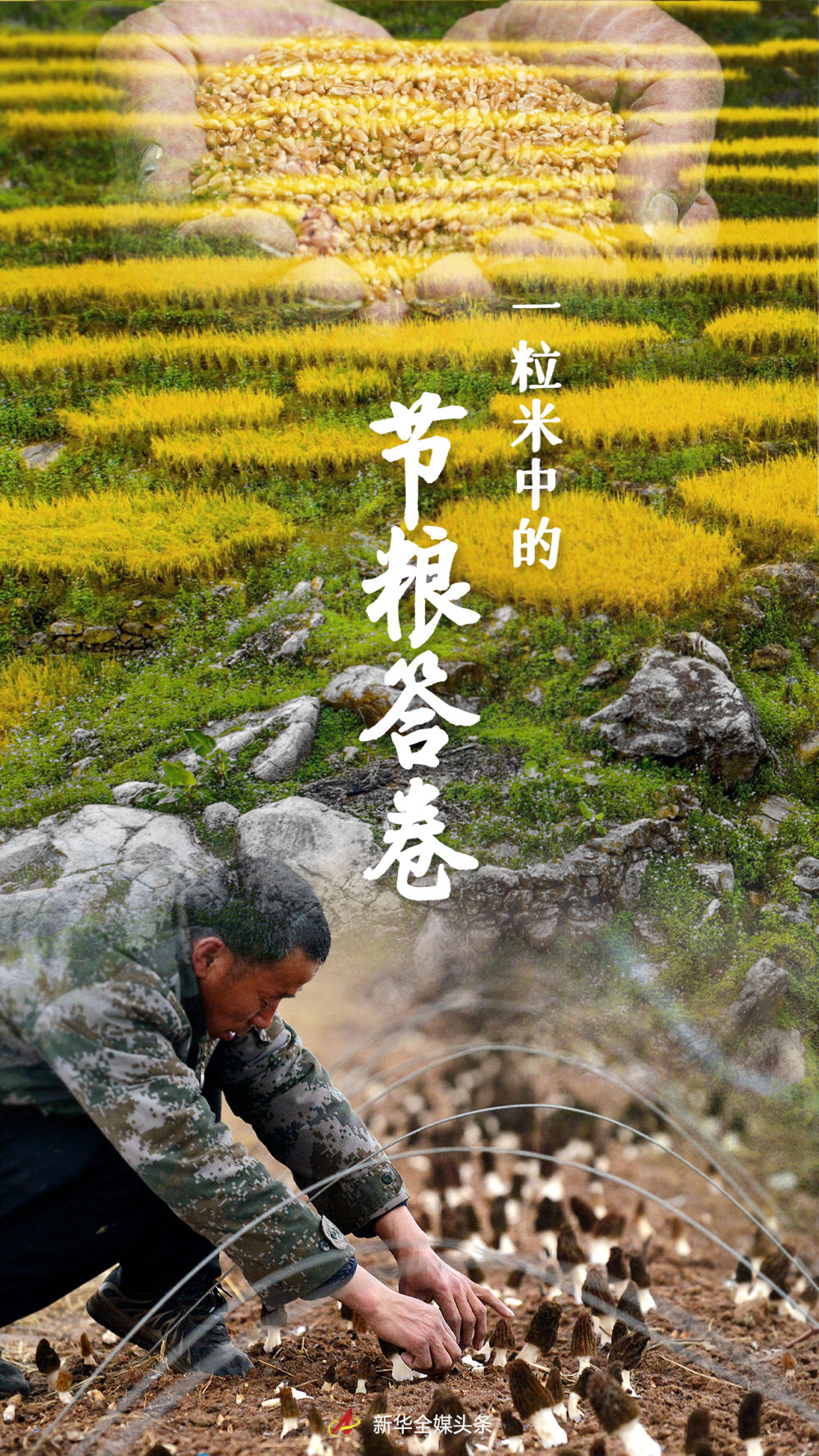
Reducing food consumption and preventing food waste are the inevitable requirements for ensuring national food security and promoting sustainable development. With the implementation of People’s Republic of China (PRC) Anti-Food Waste Law on April 29th last year, "Strictly Saving and Opposing Waste" has gradually taken root in people’s hearts, and saving "new food" is profoundly affecting the life of Chinese.
Although the grain of rice is small, it is especially shameful; Saving small things can help the country and the country. A grain reflects the brilliance of traditional virtues and the basic demands of modern civilization. Since the 18th National Congress of the Communist Party of China, the CPC Central Committee has attached great importance to anti-food waste. On the land of China, a new era of grain saving answer sheet is being written.
1% = 70 million people’s annual rations, how to cultivate "intangible fertile land"?
Looking back on last year’s autumn harvest, Liu Bin, a grower of the Great Northern Wilderness Group Rongjun Farm Co., Ltd., still remembers it vividly. He said that last autumn, there was extreme weather such as heavy rainfall, and the soil moisture of the plot was saturated, so that ordinary harvesters could not enter the ground. The semi-chain-rail rubber crawler harvester played a big role, otherwise the grain loss might increase by 10%.
"If you don’t use the semi-chain track, the harvest period will be extended to the upper freezing, which will cause corn moisture reduction, high stalk loss rate and great loss." Liu Bin said.
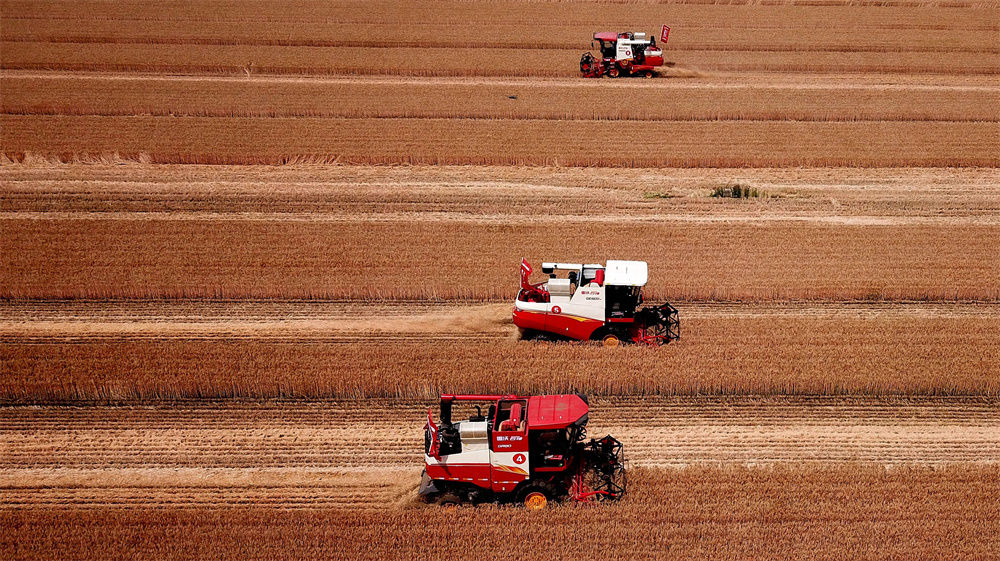
In guanqiao, Tengzhou City, Shandong Province, the national grain harvesting loss skill contest was held, and the contestants in Shandong Division operated harvesters to harvest wheat (photo of drone on June 4, 2021). Xinhua News Agency reporter Guo Xulei photo
This is a set of thought-provoking data — — According to the statistics of the United Nations Food and Agriculture Organization, the loss of global grain from production to retail accounts for about 14% of the world’s grain output every year. A 1% reduction in this loss is equivalent to an increase of more than 27 million tons of grain, enough for 70 million people to eat for a year.
Reducing food loss and waste is the "first pass" to curb food waste. In October 2021, with the publication of the Action Plan for Grain Saving, there was a clearer road map to realize grain saving and loss reduction.
The plan proposes that by 2025, the measures to reduce grain consumption in all aspects of the grain industry chain will be more hardened, concrete and detailed, and more obvious results will be achieved in promoting grain consumption reduction. The system, standard system and monitoring system for grain consumption reduction will be basically established, and the normal and long-term governance mechanism will be basically sound.
The person in charge of the Central Agricultural Office pointed out that the plan focuses on the whole chain and multi-links to carry out grain saving and loss reduction actions, which is equivalent to increasing "intangible fertile land" and opening up an important way to further safeguard national food security.
In all parts of the country, it has become a cohesive direction for new farmers to save grain and reduce losses by using new technologies, new equipment and new processes to strengthen the construction of intensive, sustainable and low-carbon modern post-natal grain service system.
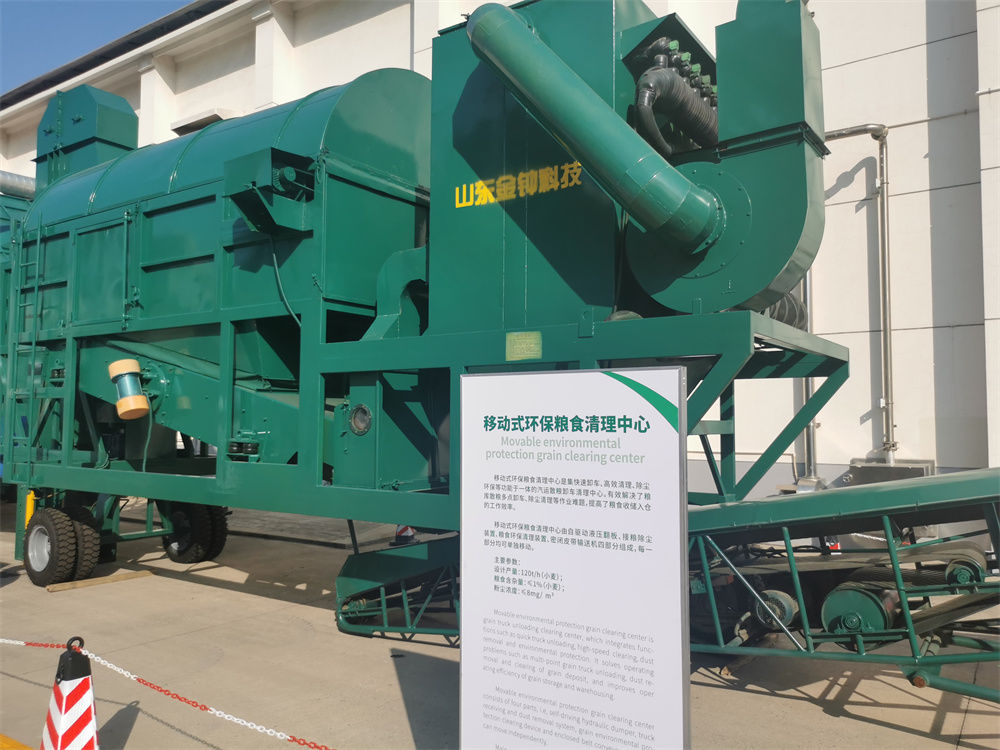
The mobile environmental protection grain cleaning center exhibited in the direct warehouse of China Grain Reserve Jinan (photo taken on September 10, 2021). Xinhua News Agency reporter Shao Kun photo
In the warehouse directly under Jinan, China Grain Reserve, there are huge granaries. Even if people don’t enter the granary, they can clearly see the grains in the granary through the high-definition camera. An Xiyou, deputy director of the Storage Management Office of China Grain Storage Shandong Branch, introduced that the granary comes with "central air conditioning" and green grain storage technologies such as intelligent ventilation. The average temperature of the granary is kept below 15 degrees Celsius all the year round, which realizes low-temperature grain storage and effectively delays the change of grain quality.
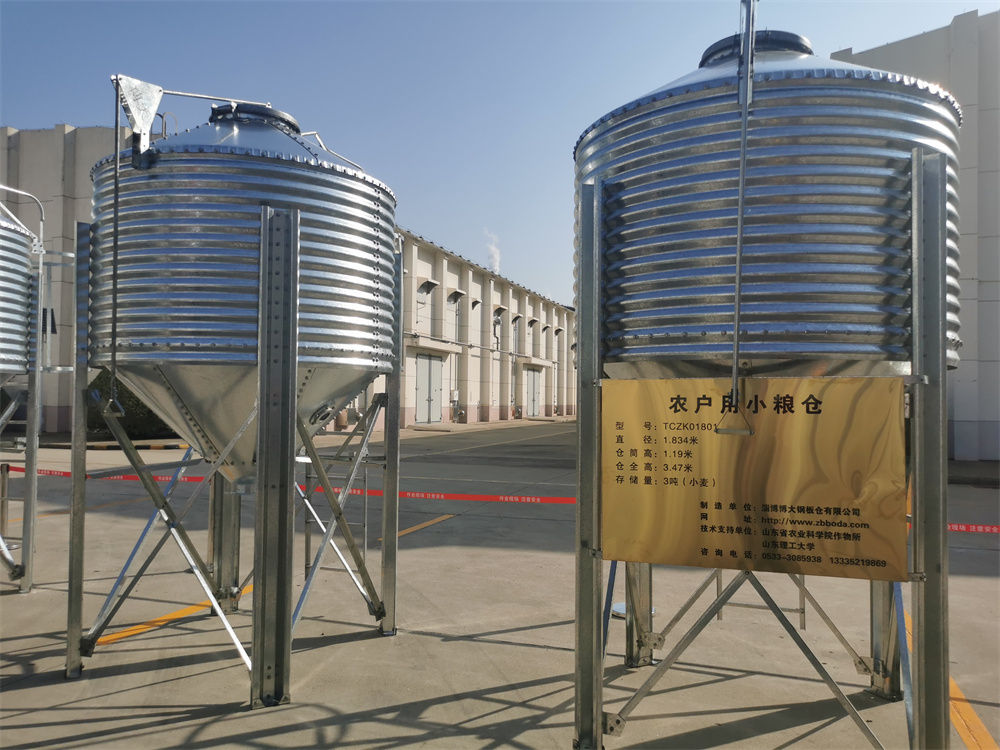
A small granary for farmers exhibited in the direct warehouse of China Grain Storage Jinan (photo taken on September 10, 2021). Xinhua News Agency reporter Shao Kun photo
In many places in Heilongjiang Province, training courses on the technology of machine harvesting impairment have been held one after another, and experts have popularized the common sense of agricultural machinery impairment. Lu Daowei, a grower of Qixing Branch of Heilongjiang Beidahuang Agricultural Co., Ltd., said that after attending the training last autumn, he chose the appropriate model strictly according to the variety characteristics and determined the harvesting method by machine according to the rice field growth, which greatly reduced the loss of grain harvested by machine.
The "big stomach king" is cool, how to carry out the "CD action" in the end?
Curbing the "waste on the tip of the tongue" in consumption is the key to saving food. In 2021, China "punched" to curb food waste. With the promulgation of a series of new regulations, such as People’s Republic of China (PRC) Anti-food Waste Law, there are laws to follow.
"Our generation is hungry, and it is really sad to see food wasted." Lv Yongjie, the fourth-generation inheritor of Beijing Ma Kai Restaurant who has been cooking since 1988, said, "If you don’t spend money, you can just waste food. Binding from the legal level can make the public pay more attention to saving and promote the speed of curbing food waste. "
Once upon a time, pretending to be a "big stomach king" in the "eat and broadcast" program and secretly vomiting while eating and drinking sea water made some live broadcast platforms become the "hardest hit" for food and beverage waste. The anti-food waste law clearly stipulates: "It is forbidden to produce, publish or disseminate programs or audio-visual information that waste food, such as eating and overeating." Nowadays, "eat and broadcast" is input on multiple network platforms, and it is difficult to see the figure of "big stomach king" in search results; There is a platform in a prominent position: cherish food and eat reasonably.
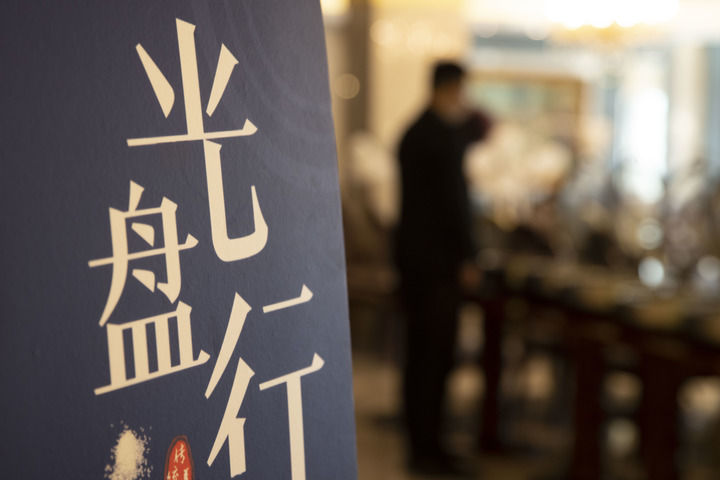
On April 28th, at the New Paris Hotel in Harbin, the staff prepared to prepare meals. Xinhua News Agency reporter Zhang Tao photo
The minimum consumption set by catering businesses has also become the target of key rectification in many places. The Regulations on Anti-food Waste in Beijing, which came into effect on May 27th, 2021, clearly stipulates this, requiring catering service operators not to set minimum consumption, and not to induce, mislead or force consumers to order too much food.
Good law also needs good governance. From the law enforcement inspection by the market supervision department to the performance of the duties of the main body of the catering market, the relevant parties have taken various measures to pay tribute to food with "CDs" and continue to advance the "CD Action".
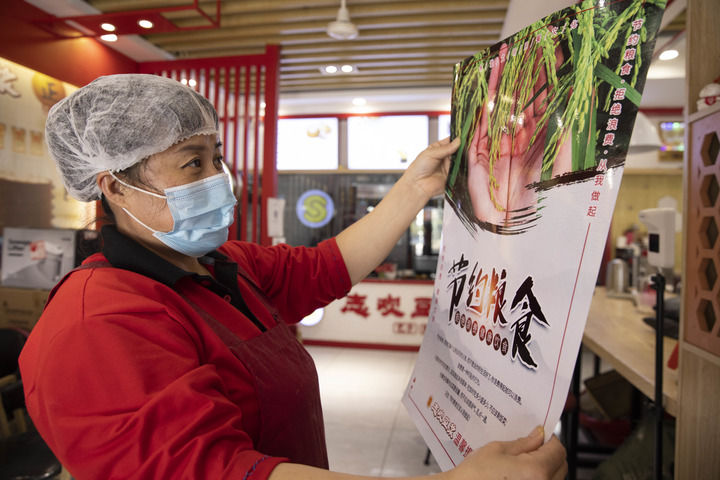
On April 28th, in a hotel in Daoli District, Harbin, the staff prepared to post a poster on saving food. Xinhua News Agency reporter Zhang Tao photo
"Have you posted relevant signs in your store? Are there any specific measures? Did you remind the dining guests not to waste? " Walking into a hot pot restaurant in Yangliuhe Street, Dujiangyan City, Sichuan Province, Wang Liming, deputy section chief of Law Enforcement Division II of the Comprehensive Administrative Law Enforcement Brigade of Dujiangyan City Market Supervision Bureau, is randomly checking whether the anti-food waste measures are in place.
Wang Liming said that the next step is to promote the standardization, labeling and refinement of catering unit menus, and strive to advocate more catering businesses to actively participate in the "CD Action" to promote consumers’ civilized dining and save meals.

The staff of a hot pot restaurant in Chengdu are packing for customers (photo taken on September 7, 2020). Xinhua News Agency reporter Li Mengxin photo
Chen Xinhua, president of China Hotel Association, said that the introduction of the anti-food waste law made "saving food" no longer just a slogan, and it was the obligation and responsibility of catering enterprises to implement the legal provisions. The practice of serving small portions conforms to the times and will further promote the high-quality development of China’s catering industry.
A set of data reflects a wave of "tongue-tip revolution" — — According to the data provided by Meituan, from the beginning of 2022 to the beginning of April, consumers actively searched for keywords such as "small dish", "half dish" and "single set meal" on Meituan platform for 1.42 million times. Compared with the same period of last year, in the first quarter of this year, the number of merchants selling small dishes in the platform increased by 110% year-on-year, and the sales growth rate of related dishes reached 128%.
"Small dining table" drives "great civilization" and "new food style" affects our future.
At the peak of passenger flow, the reporter walked into a chain store named "Hot Pepper" in Chengdu Gourmet Street, and the manager Luo Kun was guiding the guests. "Hello, we have small bowls of vegetables in our store. Strings can also be taken according to personal needs, and staple food can also be ordered first. If it is not enough, it can be added later. " Luo Kun said.
A warm reminder is a testimony that "new food is still popular". One year after the implementation of the anti-food waste law, "saving and opposing waste" has changed from posters to practical actions, and "new food fashion" in the name of saving has become a common practice.
"If a millet is planted in spring, 10,000 seeds will be harvested in autumn", "When weeding is at noon, sweat drops down the soil" … … Looking back at history, the ancient motto "Be prepared for danger in times of peace, abstain from extravagance and be frugal" is engraved in the spiritual context of the Chinese nation. Diligence and thrift are not only personal virtues, but also closely linked to the fate of the country and the nation.
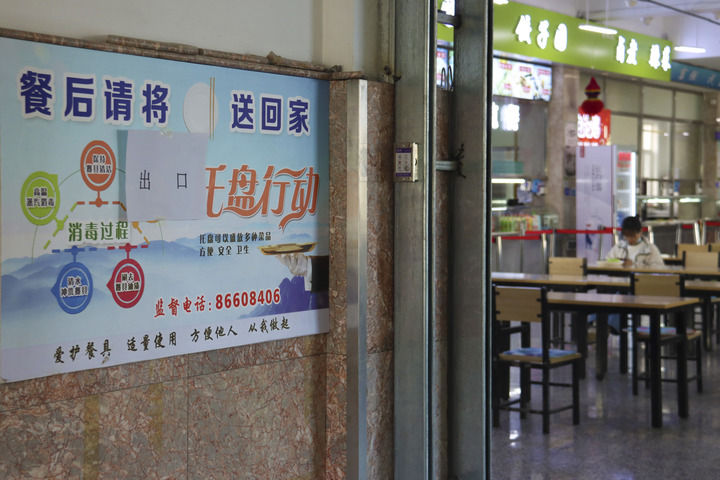
On April 28th, students ate in the student dining hall of Heilongjiang University. Xinhua news agency
Looking back at the present, the sons and daughters of China are striding towards the great rejuvenation of the Chinese nation, with rapid economic and social development and steady improvement of people’s living standards, but thrift is still an "heirloom" that we can never lose.
Legislation has been completed to prevent food waste. While doing a good job of "subtraction" and "division" to avoid waste, doing "addition" and "multiplication" to update the ideas of the whole society also requires government leadership, industry guidance and public participation to form a strong joint force to save food.
From "small dining table" to "great civilization", the whole society is acting — — From food programs to bloggers’ live broadcasts, "Cherish food and refuse to waste" was hit on the public screen by netizens; The catering industry has carried out the civilized table action in depth, and is committed to bringing economy into the whole process of food processing and catering services; In school and unit canteens, the "smart canteen" with digital catering management system is introduced to help diners realize personalized and customized cooking, from which catering managers can improve quality and efficiency and reduce food waste.
As Zhao Xiaoyan, a researcher at the Beijing Academy of Agriculture and Forestry, said, "The anti-food waste law conforms to public opinion and won the hearts of the people. We really feel the changes after legislation. The wind of saving blows into people’s hearts and blows in daily life, which will also affect our future. "
Text reporters: Chen Cong, Wang Jian, Dong Xiaohong.
Participating in writing: Shao Kun
Poster design: Zhao Danyang